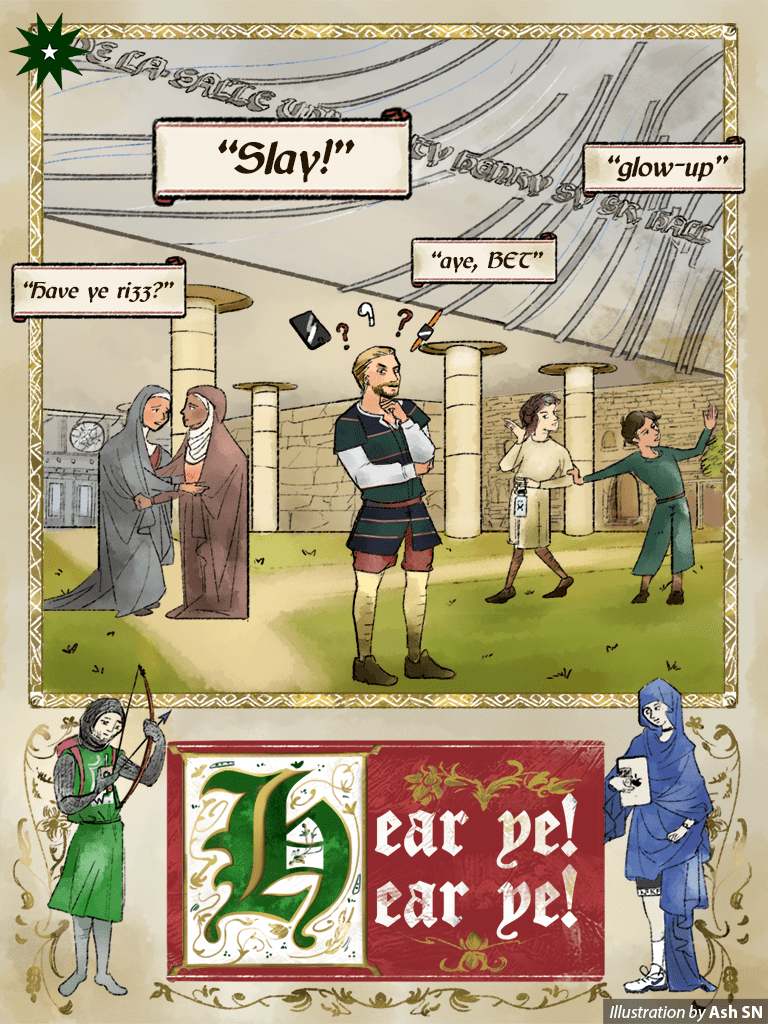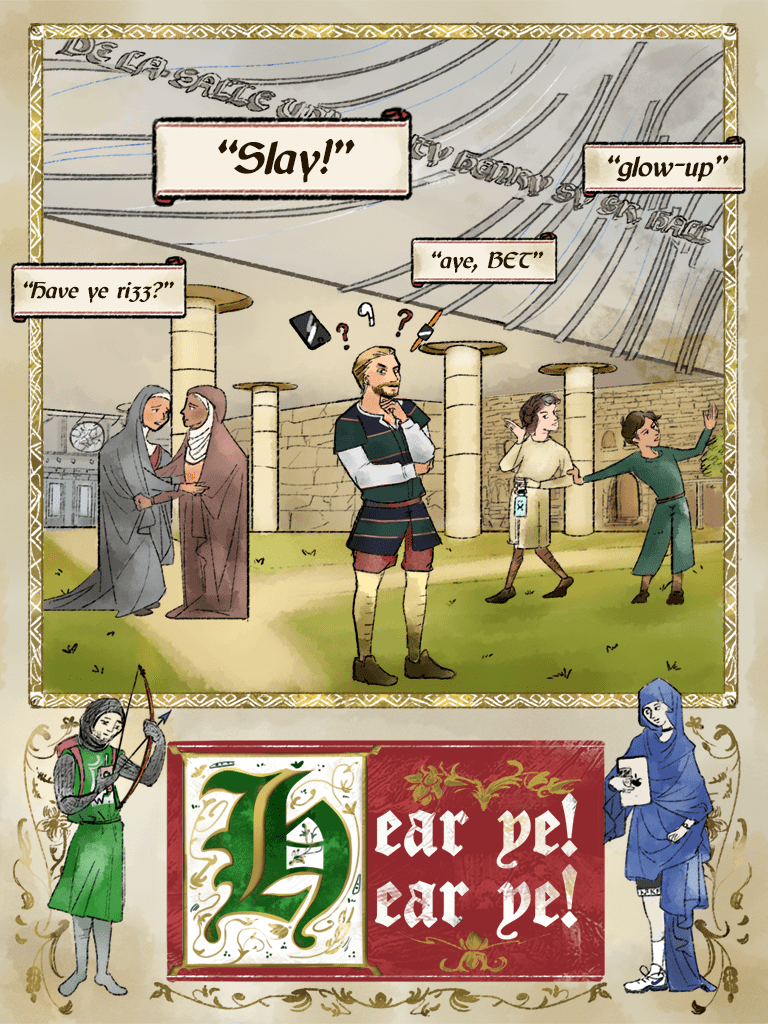Hear ye, hear ye!
Hither dost I, Henry Librarius, appear before thou, for I cometh seeking the knowledge of the future! ‘Tis with wondrous elation that I am on an illustrious journey of wisdom.
My forefathers and peers hath warneth me of the perils that I mayst encounter in my study, for the matters of morrow shalt not be trifled with lest I am afeard by what I find. Alas, t’would be folly if I alloweth wend of the chance to attaineth remarkable knowledge yet unbeknownst to mankind—I faith, my findings shalt be ground-breaking!
To attaineth the knowledge yond I seeketh, I hath reached out to the youth I stumbled upon mine own arrival: at an institution dubbed De La Salle University. I marvel much at such an estate of gathered intelligence, a high-sighted vocation to educate the peasants! These peasant scholars dub themselves as “Lasallians” and weareth the most strange clothing, and mayhaps coequally wayward, the large amount of wenches in attendance. Hark on that! No matter, I shall anon presenteth to thee mine own linguistic findings, the so-called “slang” of the 21st century.

Tolerable turns of phrase
Verily, mine sojourn doth commence in that place dubbed Agno, where ’tis said many a peasant scholar doth gather to break their fast. One such word that doth catch mine ear from a passing troupe of maidens be “slay,” which they do claim means “to do something well”. ‘Tis a fascinating thing, though I doth not wholly approve of such visceral imagery in conveying the mere idea of excellent aptitude, forsooth. Nathless, ’tis come to mine understanding that “slay” invokes the great honor of winning in battle.
These peasant scholars did teacheth me another fascinating term: “glow up”—which they avow doth mean to undergo a wondrous transformation of the self. ‘Tis a most tolerable phrase that doth convey the transformative nature of light; I doth relish the creative imagery these peasant scholars do employ. Yea, even I myself have undergone a “glow up” in mine own blossom from the innocence of youth to the fullness of adulthood.
Lo, these gentle wenches do speaketh of a most curious matter—being “canceled”—which doth entail being vilified for one’s perceived wrongdoings. Verily, it doth give me pause, and yet I am most wary of it. But these maidens do assure me that there be no angry mobs with torches in these parts. I have come to comprehend it as being akin to being excommunicated, forsooth, as thou art also excluded from thy social circles. Truly, ’tis a most intriguing linguistic concept!
At long last, a band of male youths who they say hail from the ridges of the south and green hills and possess curious, drawling accents did instruct me in a most intriguing term—”rizz”. They did aver it be a shortening of “charisma” and doth indicate skill in the art of charming. Rizz! What a wondrous and exquisite word! It doth bring to mind the thrill of a love pursuit and the acumen a suitor must possess in the quest for a fair lady’s hand. Indeed, I would venture to say that knights ought to display not only a chivalrous heart but also a rizz-like bearing.
Trifling matters of yonder
To mine own hoyday, these peasant scholars, hath brought forth lexicon befitting of their quality, truly did fill with ingenuity yond thee wouldst not comprehend by thyself. Howbeit, as is the destiny of mankind, there art areas of discussion less intelligent than others and dost fail to reflect brilliance.
Returning back to the pleasant maidens I hath encountered, thee extol mine own attire, but thee hath used such a bewildering and zany speech—the wenches declared “I ate”. By my troth! Doth they mean to insinuate I behold liketh I just consumed a meal, that mine own appearance most disheveled? Those maidens apace assured me yond wast not the case, they were commending mine own garments even, yet I wast already stirred. I urged the peasant scholars to think carefully upon thine slang, lest they offend a madam or gentleman in foolishness.
Yet, eating couldst not compareth to the pair of stupefying terms used by the peasant scholars to manage their personal affairs. “Carpets” hath connoted a question of availability, whereas “pictures” wast acceptance to the aforementioned invitation. I hath found such vulgar and open proceedings of personal matters to be quite uncouth, though perchance these are signs of the changing times I fail to perpend.
Mayhaps the most abhorring, the invokement of betting and gambling. What hath thee wrought! Why doth the youth of this generation use “okay, bet” as a sign of agreeableness? Mine own scholarly mind attempts not to deduce from whence such slang comes, or who hath been privy to such immoral methods, although it is clear it leads these poor peasants astray, by my faith!
I doth not understand wherefore the youth continues to useth such expressions, and I assay mine own ability to trow these words may beest of sensical origins, yet reason fails me.
Commendations and condemnations
Verily, this college containeth both linguistic marvels and terrors that doth surpass mine belief. Who would have foreseen that these abodes of erudition in the 21st century would nurture such fancifulness and tomfoolery in the form of “slang”? Though these sanctums of scholarship doth promote the liberty of cogitation and discourse, perchance it would be a prudent endeavor for these younglings to employ a proper lexicon, lest it lead to the bewilderment and chaos that I have oft encountered today! Such madness! Such stupendousness!



